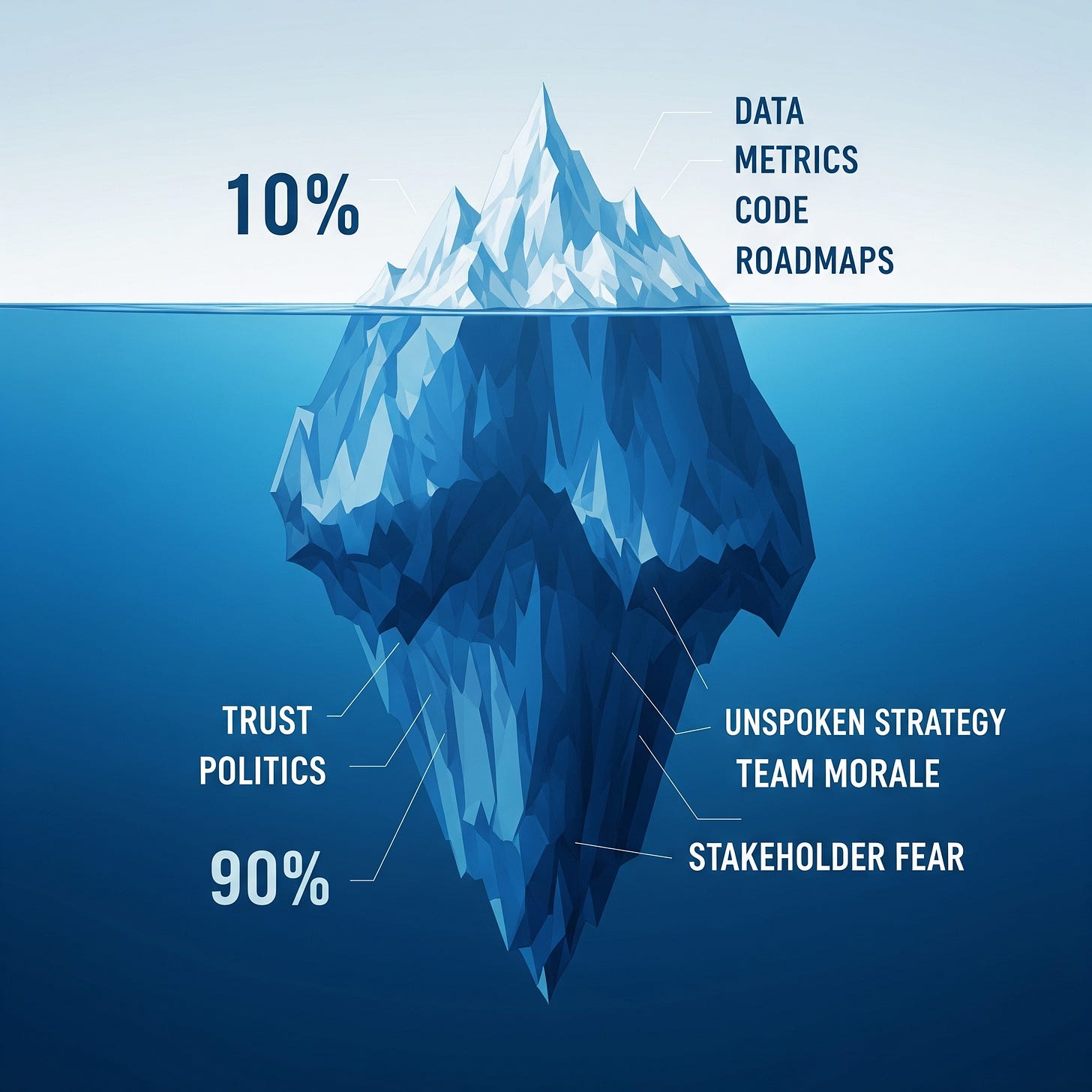Hey! Nacho here. TLDR; After a long pause, I’m back to writing because we’re facing the most profound shift of our careers. AI is rapidly commoditizing the core skills on which our two decades of experience are built, effectively turning anyone into a 90th-percentile expert on specific tasks. This is why our value must urgently shift from doing the work to directing it, becoming an 'Orchestrator'—a leader who leverages their experience to provide strategic context, navigate the human side of product, and apply contextual judgment.
We are standing at the most profound inflection point of our professional lives. Everything is rapidly changing. I want to share my journey—our journey—as we navigate this new world and redefine what it means to be a Product Leader.
Let’s start with a provocative thought that has been keeping me up at night: my 20 years of experience in product management will likely be worthless in less than a year1.
Now what?
The Great Equalizer
For two decades, I’ve honed my craft. I’ve learned frameworks, shipped products, interviewed hundreds of users, analyzed countless data charts, and made priority calls that have shaped businesses. That was my value. That was my expertise.
Now, anyone can do it with a $20 subscription.
Think about it. With the right prompt, a Large Language Model app can generate a diagnosis of an X-ray with 99% accuracy. It can provide legal advice on par with a 90th percentile lawyer.
The same is happening to our profession.
A recent graduate can now use AI to:
Analyze user feedback and surface key insights instantly.
Draft user interview scripts that are free of bias.
Prioritize a backlog using the RICE framework, complete with data-backed estimations.
Write perfectly formatted user stories and align technical requirements.
All the core tasks that form the bedrock of a PM's skill set are becoming commoditized. AI is the great equalizer. It’s a tool that can elevate anyone to a 90th percentile performer in (almost) any task.
So, the terrifying question we must ask ourselves is this: Why would a company hire you, the 20-year veteran, over a sharp 22-year-old who has mastered these new tools?
The Redefined Entry-Level "Threat"
There’s a popular narrative doing the rounds that AI will eliminate all entry-level jobs. I don’t buy it. I think it can be the opposite. The nature of entry-level jobs is being redefined. And for many experienced professionals, that’s an even bigger threat.
A junior PM who is a virtuoso with AI tools could now potentially outperform a 40-year-old veteran on many core tasks. They can do it faster, and possibly with more data-driven rigor. Their lack of "experience" is irrelevant when they have a world-class expert AI as their co-pilot.
Your experience is not the advantage you think it is.
So, if our hard-won knowledge of frameworks and processes is no longer a differentiator, what is?
From Expert to Orchestrator
Your value is no longer in doing the tasks. It’s in directing them.
Your experience is not an advantage in execution. But it can be a massive advantage in orchestration. The game has shifted from being a player on the field to being the coach who sees the entire game, directs the players, and calls the shots.
This orchestration is your defensible advantage, and it looks like this:
1. You Provide the Strategic Context
An LLM with access to all your data is still operating within a closed system. It knows what is in the data, but it doesn't know the crucial "why" that drives the business. It doesn't know the CEO just returned from a board meeting with a new, unspoken mandate to achieve profitability at all costs.
2. You Integrate the Cross-Functional Puzzle
AI can give you a perfectly optimized marketing message, a technically feasible feature spec, and a data-driven priority list. But are they coherent when put together? Your role is to be the master synthesizer.
You connect the dots across the entire organization—sales, marketing, engineering, and support—and weave the disparate, AI-generated outputs into a single, cohesive product strategy.
3. You Navigate the Human Operating System
Product Management has always been about people, and that's now more critical than ever. An LLM might identify that the biggest opportunity lies in a project requiring collaboration between two specific teams. What it can't know is that the leads of those two teams have a toxic relationship and can't work together effectively 💩
An experienced PM knows this human context, and can look for workarounds: "Given the political constraints, can Team A build an 80/20 version independently? Can we use a third-party tool to bypass the internal gridlock?"
This is an exaggerated example. But we will still face the daily, subtle challenges: persuading a risk-averse stakeholder, motivating a team facing burnout after a tough quarter, or understanding why the sales team really keeps asking for that one specific feature.
Navigating the organization's messy, human reality is a skill built on experience.
4. You Apply Judgment and Take Accountability
An LLM is a powerful advisor, but it cannot take accountability. The final decision—the bet—still rests on your shoulders.
A junior PM can now ask fantastic, data-driven questions. But the experienced leader's role is to take those questions and ask the even better, context-infused ones:
"Is this the right question for our strategy right now?"
"Is this the right question for our team's unique human dynamics?"
"Is this the right question given what could go wrong?"
The value of experience, then, isn't in finding the signal in the data anymore. The value is in interpreting that signal through the lens of business strategy, human politics, and past failures to frame the truly winning inquiry.
Your New Job: Learn Faster Than Everyone Else
Here’s the hard truth. Your experience is a double-edged sword.
The greatest pro is your deep, intuitive understanding of how the product operating model works. This allows you to direct the AI with more strategic intent.
The greatest con is that you are probably not on the cutting edge of what these new tools can do.
This means your past accomplishments are no guarantee of future success. We all need to get on the +75th percentile of AI-Powered PMs, at a minimum, just to stay relevant.
The most critical skill for the next five years is not your existing knowledge. It is your speed of learning. You need to be dedicating time every single week to experimenting with these tools, pushing their limits, and integrating them into your workflow.
Our careers are not over. But they are being fundamentally transformed. The value has shifted from knowledge and execution to wisdom, orchestration, and judgment.
This isn't just about survival; it's about leverage.
An AI-powered Orchestrator is a force multiplier. By offloading 80% of our tactical work to AI, we free ourselves to focus on the deep strategic work we never had time for. An experienced orchestrator, amplified by AI, can create more value and drive more impact than was ever possible before.
My goal with this revived newsletter is to share this journey with you—the learnings, the failures, the new frameworks—as we all figure out how to make our experience count in the decade to come.
So, I’ll leave you with a question: Is there a part of your PM job you believe AI will never be able to replace? Let’s discuss it in the comments.
This timeline is intentionally provocative, but it’s grounded in the accelerating debate around Artificial General Intelligence (AGI), with some leading researchers now placing its arrival within the next year.







I hope this post can be your next video/talk or even course! It would be amazing!
I can't agree more! I think AI (with an even more gigantic impact) is quite the same as Excel for accountants a few years ago. You still need to do the people work.
AI can explore, analyze, use multiple frameworks with massive amounts of data.
But it will never understand (or at least not yet) humans with their differences, the context they live in, their hopes, their spoken and unspoken goals, desires, and needs.
it reminds us that a leadr job is first is a people job. You need to help your people thrive not only with technical knowledge (which can now be partly done by AI), but even more importantly with human skills: by being supportive, by creating the best environment, by being a good listener, by being a good example… and by giving a vision and a clear direction to your people.
Mostly, all the work that leaders don’t do so much in real life, because they don’t have time and still focus too much on “technical” work, but also because it’s easier to do technical work when we’re experts in it. When People work is always (I think) seen as harder.